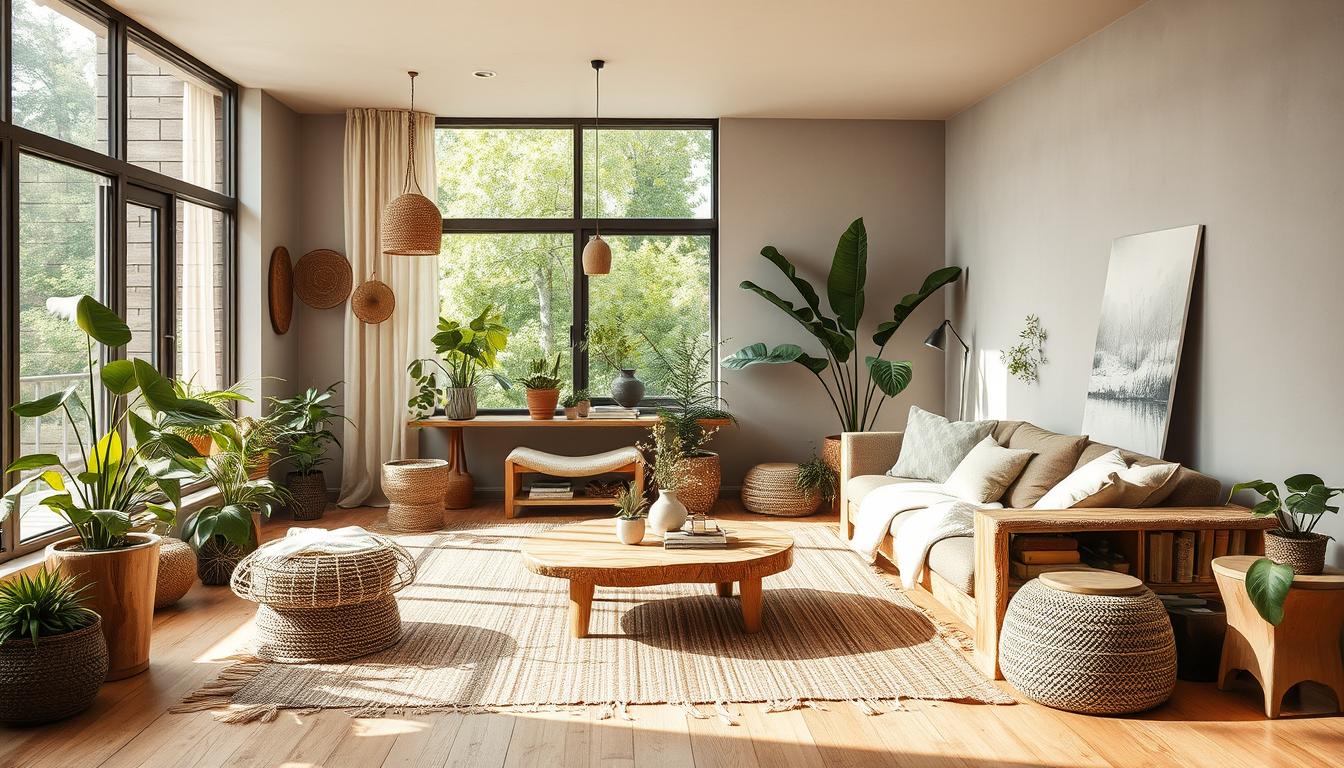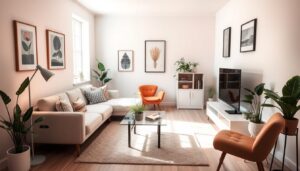Environmental awareness is growing, and so is the home decor industry’s focus on eco-friendly innovations. This article looks at 15 new sustainable home decor trends. They mix style with care for the planet. Trends include using reclaimed wood and adding nature-inspired elements to homes.
More people want to live sustainably, and that’s changing home decor. They look for decor that’s good for the planet and looks great. These trends show it’s easy to make homes that are both beautiful and green.
The Rise of Eco-Conscious Interior Design
The need for eco-conscious design and sustainable interiors is growing. People want homes that look good and are good for the planet. Designers and homeowners are now choosing green home trends to make spaces that are both beautiful and eco-friendly.
Understanding Sustainable Home Decor
Sustainable home decor uses materials that are renewable, recycled, or reclaimed. It also includes energy-saving technologies and designs. This way, homes can be both comfy and good for the environment.
Impact on Environmental Conservation
Choosing eco-conscious design helps the planet a lot. Homes that use sustainable materials and save energy can lower carbon emissions. They also help save natural resources and support local sustainability.
Consumer Awareness and Demand
More people want homes that are good for the planet. This desire for sustainable interiors and green home trends is driving change. Designers and makers are now creating eco-friendly products to meet this demand.
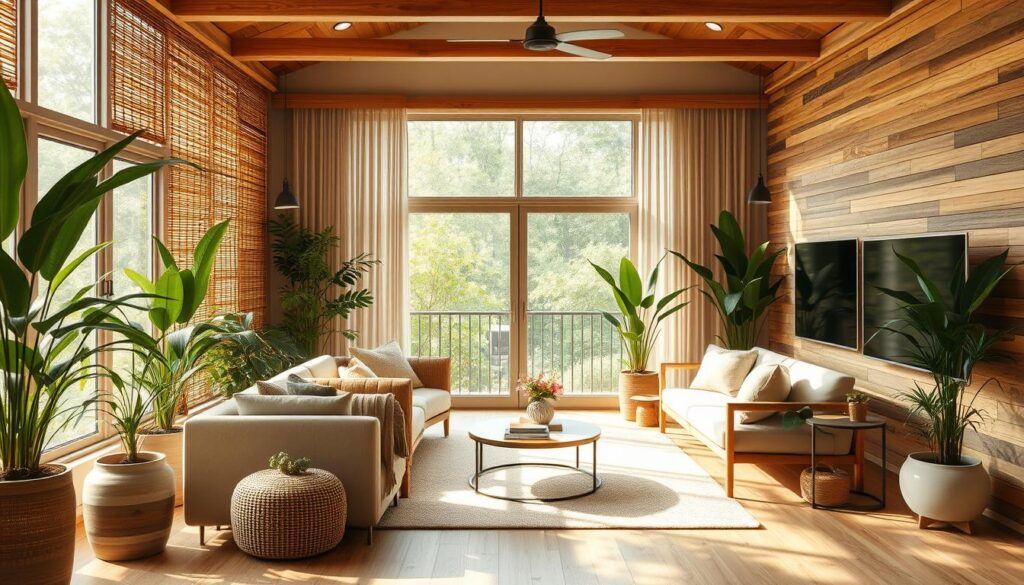
The trend towards eco-conscious design is changing the interior design world. Sustainable interiors and green home trends are becoming the norm for modern homes.
Reclaimed Wood Furniture and Accessories
Upcycled wood furniture is becoming more popular in home decor. It uses old wood from buildings, barns, or industrial sites. This reduces the need for new wood and helps save forests.
Reclaimed wood decor is loved for its unique look and lasting appeal. Each item has a story, with weathered marks and imperfections. These add depth and charm to any room. Designers and makers are creating special tables, shelves, and accessories from salvaged wood.
Using reclaimed wood in furniture also sends a strong environmental message. It gives old materials a new life, helping the environment. This approach reduces waste and cuts down on the harm caused by making new furniture.
| Benefits of Reclaimed Wood Furniture | Sustainability Features |
|---|---|
| Unique character and charm | Reduces demand for new timber |
| One-of-a-kind designs | Contributes to the circular economy |
| Durable and long-lasting | Minimizes environmental impact |
More people want sustainable living, so upcycled wood furniture is in demand. It brings character and charm to homes. It also shows a commitment to protecting the environment.
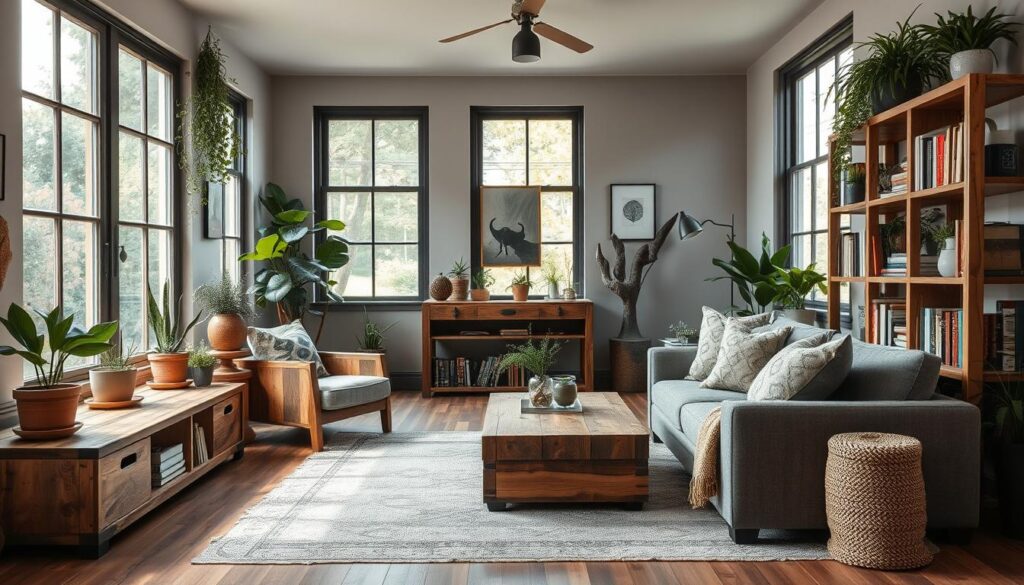
“The beauty of reclaimed wood lies in its unique history and the stories it has to tell. Each piece is a testament to sustainability and a celebration of the natural world.”
Biophilic Design Elements
Biophilic design brings nature into our homes in a unique way. It combines sustainable elements to make spaces that are good for us. This trend helps us feel more connected to nature.
Living Walls and Vertical Gardens
Living walls and vertical gardens are eye-catching in biophilic design. They make our homes look beautiful and clean the air. They also add moisture and create a peaceful vibe.
People are putting these green walls in their living rooms, kitchens, and bathrooms. It turns their homes into calm, natural spaces.
Natural Light Optimization
Biophilic design also values natural light for its health benefits. Homeowners find creative ways to let in more sunlight. They use windows, skylights, and light colors to do this.
This approach helps reduce the need for artificial lights. It saves energy and makes our homes more eco-friendly.
Indoor Plant Integration
Adding indoor plants is key in biophilic design. People choose from many plants to decorate their homes. These plants make rooms look better and improve air quality.
They also help us relax and feel better. By using biophilic design, we can make our homes healthier and more sustainable.
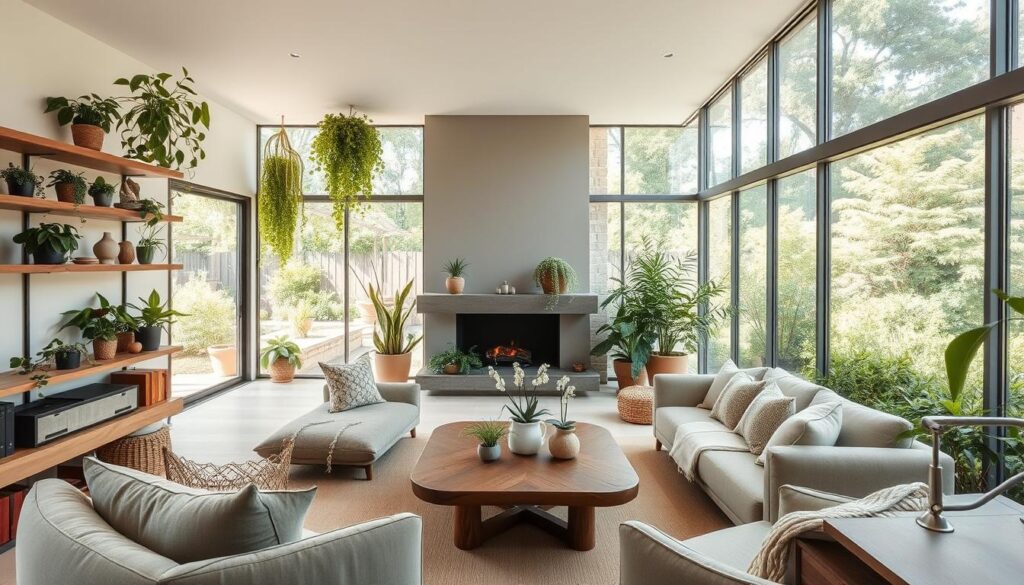
Zero-Waste Decor Solutions
Zero-waste decor is becoming more popular. It uses recyclable, biodegradable, or repurposed materials for waste-free decorating. People are making eco-friendly home accessories and sustainable decor ideas to beautify their homes and help the planet.
Repurposing everyday items is a key part of zero-waste decorating. Glass jars can become stylish vases or candle holders. Old wooden pallets can turn into unique shelving or coffee tables. This way, people can create sustainable decor ideas with a personal touch.
Natural, biodegradable materials are also used in zero-waste decor. Bamboo, cork, and natural fibers like jute and hemp are favorites. They make eco-friendly home accessories and add elegance while being eco-friendly.
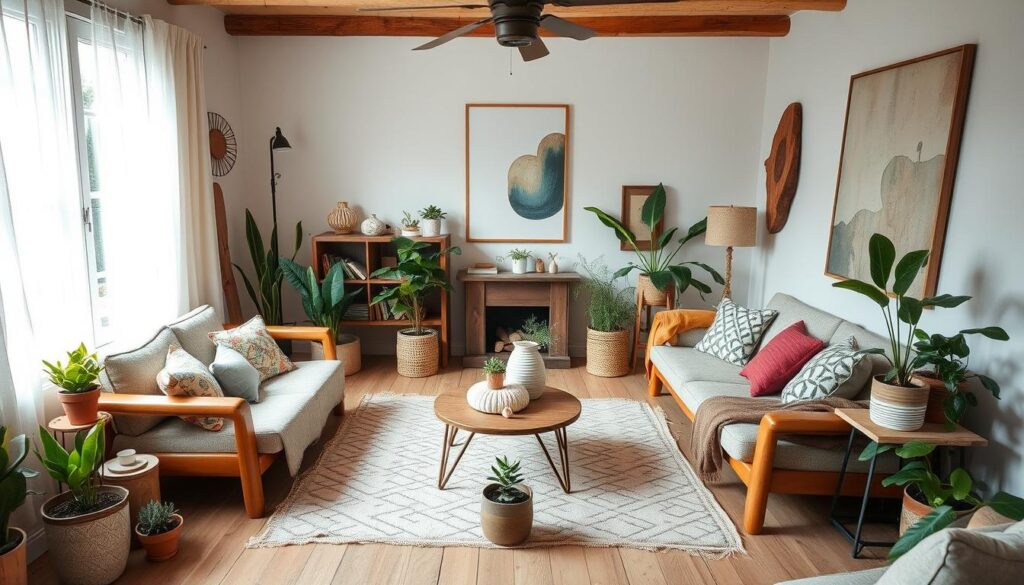
More people are choosing zero-waste decor solutions. This shows a growing awareness of making eco-friendly choices for home decor. By doing so, homeowners can make their homes beautiful and sustainable.
Sustainable Textiles and Fabrics
The need for eco-friendly home decor is growing fast. Sustainable textiles are leading the way. They look great and are good for the planet, showing big steps forward in green fabrics.
Organic Cotton and Hemp Materials
Organic cotton and hemp are stars in the green textiles world. They’re grown without bad chemicals, which is better for the earth. These natural fibers are soft, strong, and let air through, perfect for many home items.
Recycled Fabric Innovations
Recycled fabrics are changing home decor for the better. Old materials like plastic bottles are turned into eco-friendly fabrics. These sustainable textiles cut down on waste and look cool, unlike regular fabrics.
Natural Dye Processes
The move to organic home textiles has brought back natural dyes. These dyes use plants instead of chemicals, which is kinder to the earth. They add a special touch to fabrics, like bright indigo and warm ochres, loved by those who care about the planet.
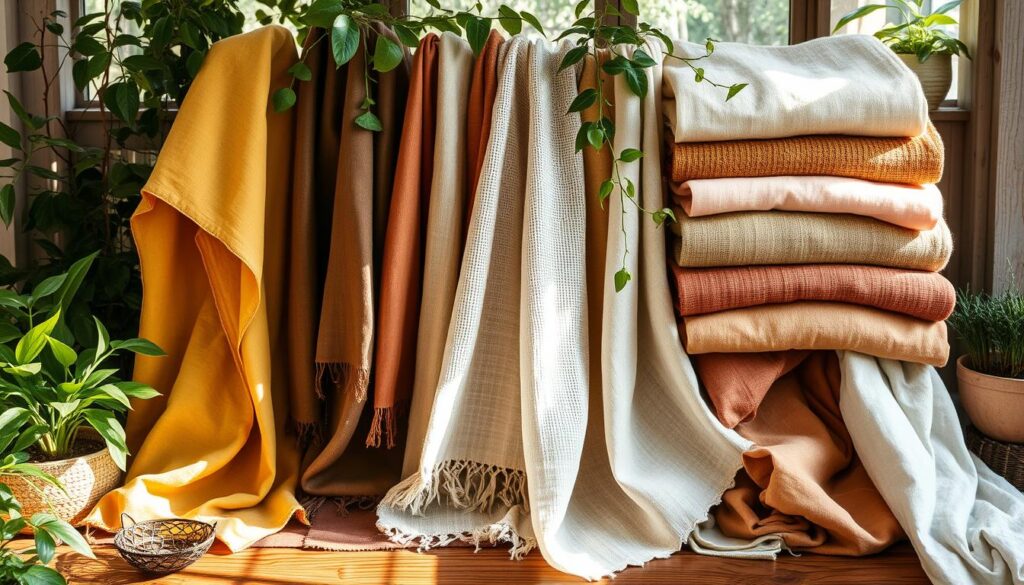
“Sustainable textiles are not just a trend, but a way to revolutionize the way we approach home decor and create a more environmentally responsible future.”
Energy-Efficient Lighting Trends
Energy-efficient lighting is key in the eco-friendly home decor movement. It includes LED technology and smart lighting systems. These innovations save energy and make homes look better.
LED lighting is a big trend now. It uses much less electricity than old bulbs. LEDs also last longer and look better, making them great for green homes.
Smart lighting systems are growing fast too. They work with home automation to let you control lights easily. This helps save energy and makes your home more comfortable.
Energy-saving light fixtures are also popular. They look good and save energy. This means you can have stylish homes that are also kind to the planet.
More people want to live sustainably, so energy-efficient lighting will keep getting more popular. It helps the environment and makes homes look amazing.
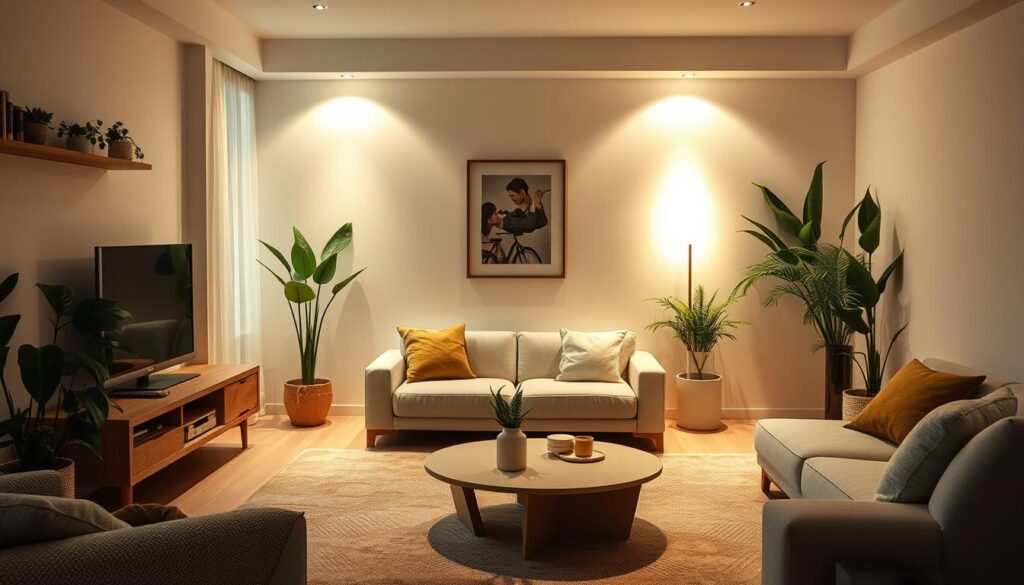
“Lighting accounts for a significant portion of a home’s energy consumption, so it’s crucial to explore energy-efficient solutions that can make a real difference in reducing our environmental impact.”
Minimalist and Multifunctional Furniture
The need for eco-friendly home decor is growing. Minimalist and multifunctional furniture are at the forefront. They cut down on waste and make the most of space, appealing to those who care about the planet.
Space-Saving Designs
Minimalist decor is all about simplicity. It focuses on what’s essential, not what’s extra. Items like foldable tables, wall shelves, and sofas that change shape help keep homes tidy and stylish, even in small spaces.
Modular Furniture Solutions
Multifunctional furniture goes a step further with its modular design. Pieces like storage ottomans and sofas that can be rearranged meet changing needs without the need for new furniture. This fits perfectly with the minimalist and space-saving ideals.
| Feature | Minimalist Decor | Multifunctional Furniture |
|---|---|---|
| Aesthetic | Clean lines, neutral colors, and a focus on simplicity | Adaptable designs that can be reconfigured to suit different needs |
| Function | Maximizing space and reducing clutter | Offering multiple uses in a single piece of furniture |
| Environmental Impact | Minimizing resource consumption and waste | Reducing the need for frequent furniture replacements |
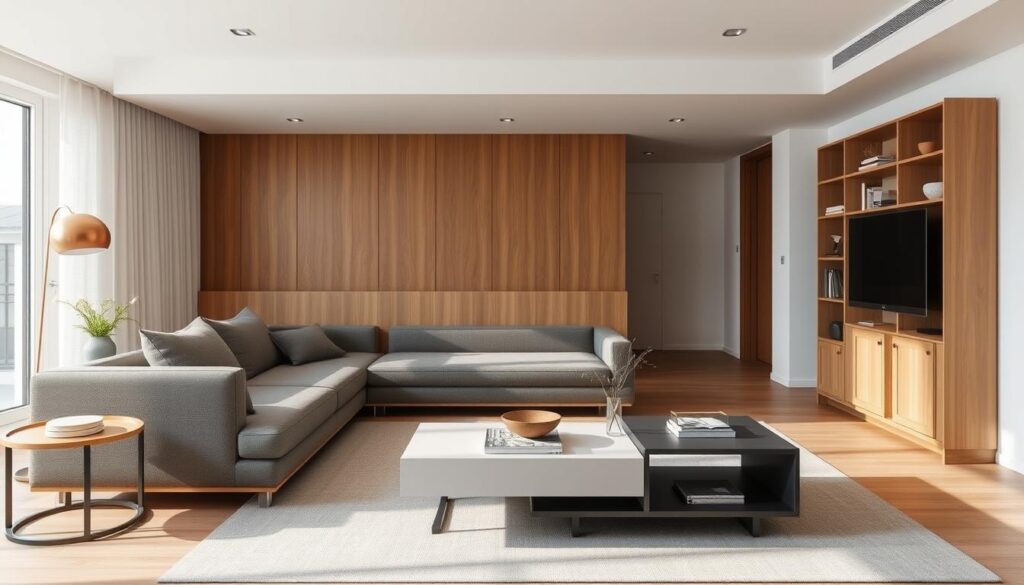
Choosing minimalist decor and multifunctional furniture lets homeowners create beautiful, space-efficient homes. These choices not only match their style but also help the environment.
Upcycled Art and Decorative Pieces
The trend of upcycled art and decor is taking off in home design. These pieces turn old materials into repurposed decor items. They give new life to things we might otherwise throw away.
Upcycling sparks creativity and innovation. People find new uses for everyday items, turning them into upcycled home accessories. Imagine wood from old furniture becoming stunning wall art or vintage clothes becoming colorful throw pillows. The options for sustainable art are endless.
“Upcycling is not just a trend, but a lifestyle choice that allows us to reduce our environmental impact while expressing our individuality through one-of-a-kind home decor.”
Upcycled art and decor fit perfectly with the eco-friendly home design trend. People want unique, sustainable items that tell a story and show their values. By choosing upcycled decor, homeowners can create a space that’s both beautiful and good for the planet.
- Repurposed wood from old furniture or pallets turned into unique wall hangings or shelves
- Vintage suitcases or trunks upcycled into coffee tables or end tables
- Reclaimed metal from industrial equipment transformed into striking sculptures or candle holders
- Upcycled glass bottles or jars used as vases, planters, or decorative lighting fixtures
| Upcycled Decor Item | Original Material | Transformed Purpose |
|---|---|---|
| Wall Art | Reclaimed Wood | Unique Home Decor |
| Coffee Table | Vintage Suitcase | Functional and Decorative |
| Candle Holders | Reclaimed Metal | Sustainable Lighting |
| Planters | Upcycled Glass Bottles | Indoor Greenery |
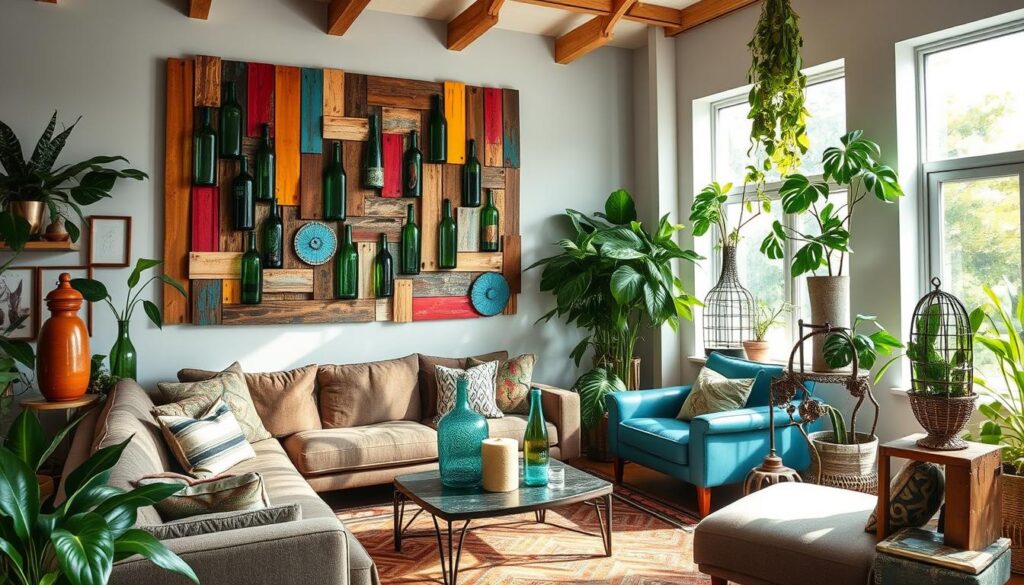
The trend of upcycled art and decor shows how much people want sustainable, unique home decor. By choosing upcycled items, homeowners can make their homes special and eco-friendly. It’s a way to show off their style and values.
Cork and Bamboo Applications
More and more people are choosing eco-friendly home decor. They’re picking natural materials like cork and bamboo. These options are great for floors and walls, adding beauty and helping the planet.
Sustainable Flooring Options
Cork flooring is becoming a favorite for those who want something different. It’s durable, comfy, and looks great. Plus, it keeps your home warm in winter and cool in summer, saving on energy costs.
Cork also fights off moisture, mold, and mildew. This makes it perfect for busy areas and bathrooms.
Bamboo is another green choice for floors. It grows fast, so it’s good for the environment. Bamboo floors come in many colors and patterns, fitting any style.
Wall Covering Innovations
Cork and bamboo are also changing wall decor. Cork wallpapers and panels add a natural feel to rooms. They’re made from cork waste, reducing landfill.
Bamboo wall panels and tiles bring a modern vibe. They’re strong and look great, fitting well with green design trends.
Homeowners are now choosing cork and bamboo for their homes. These materials are making spaces better and greener. They’re changing how we decorate our homes for the better.
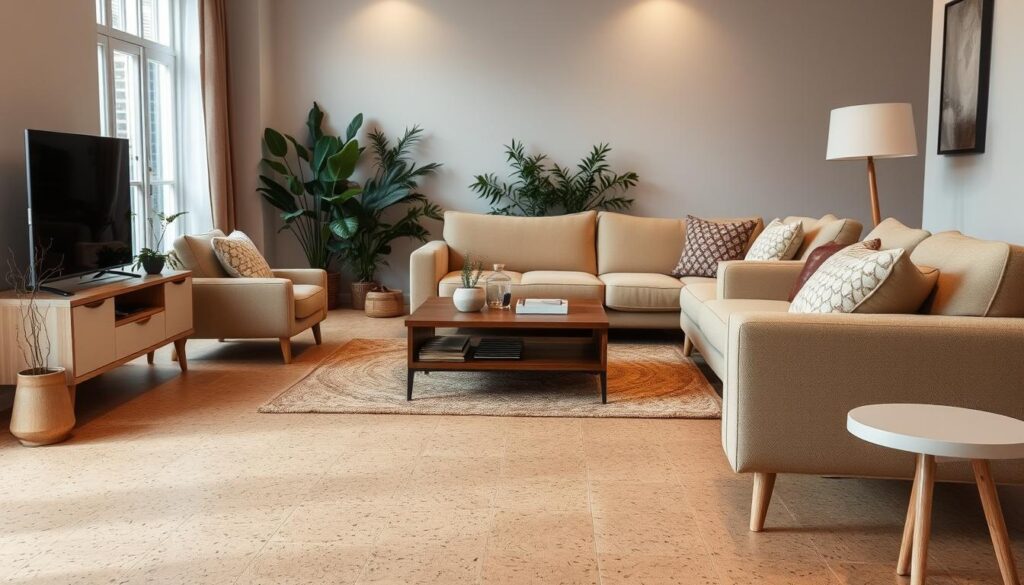
Natural and Non-Toxic Finishes
The need for sustainable home decor is growing. Eco-friendly paints, natural wood stains, and low-VOC finishes are key. They make your home look great and keep it healthy, all while being kind to the planet.
Eco-friendly paints use natural ingredients instead of harsh chemicals. These eco-friendly paints make your air cleaner and safer. They cut down on harmful VOCs.
Natural wood stains come from plants and oils. They bring out the wood’s beauty without synthetic chemicals. These stains protect the wood and make your space feel cozy.
Low-VOC finishes are better for your home’s air. They’re made with safer materials like water-based polyurethanes. These finishes are tough but gentle on the environment and your health.
Choosing natural finishes helps our planet. It also makes your home a warm and welcoming place.
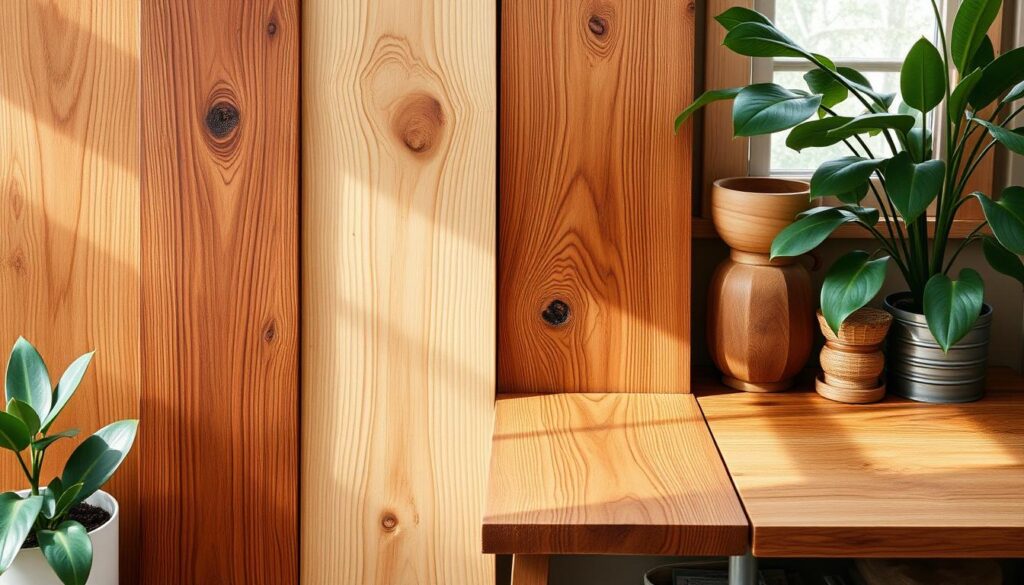
“Sustainable home decor is not just about aesthetics, but also about creating a healthy, eco-friendly living environment for ourselves and future generations.”
Vintage and Second-Hand Furniture Revival
The trend of using vintage and second-hand furniture is growing. It’s good for the planet and makes homes more interesting. People are finding new ways to use antique furniture restoration and vintage decor in their homes. They mix these old pieces with modern sustainable furniture options.
Restoration Techniques
Bringing old furniture back to life needs skill and creativity. Experts can make old furniture look new again. They refinish and reupholster pieces, making them stand out in any room.
More people are looking for local artists to restore their vintage finds. This way, they can keep their furniture’s history alive.
Mixing Old with New
Combining vintage and modern furniture is an art. Homeowners are finding ways to mix old and new beautifully. They pair modern pieces with the charm of vintage decor.
This creates spaces that are both unique and eco-friendly. It shows how to blend past and present in a stylish way.
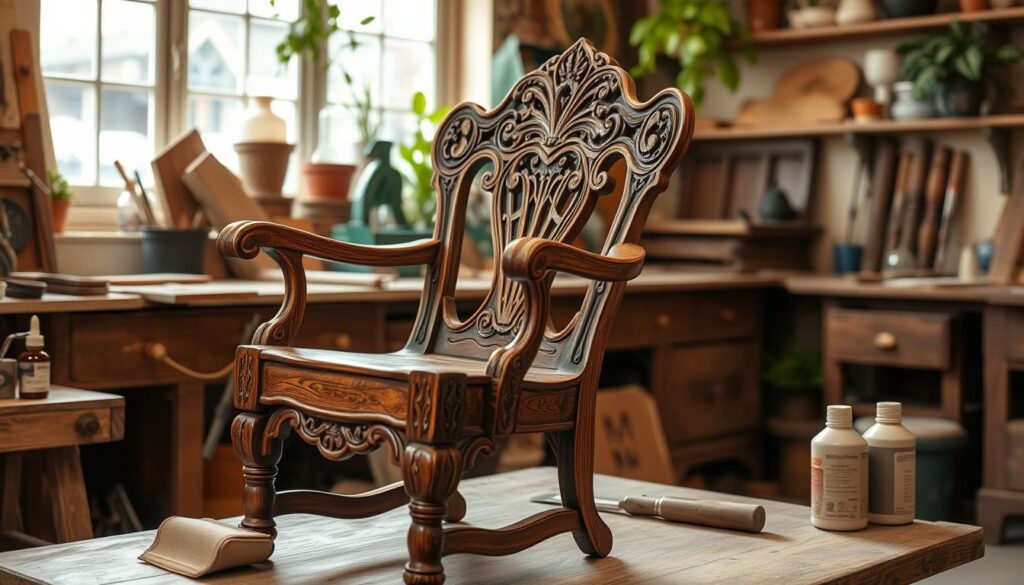
“Vintage furniture is not just about nostalgia; it’s about creating a space that reflects your personal style and values.”
Conclusion
Looking back at the 15 sustainable home decor trends, we see a shift towards green living. Trends like reclaimed wood furniture and biophilic design show a big push for sustainable living and eco-friendly home design.
People are now choosing green interior trends that make homes look good and help the planet. These choices help us build homes that are not only beautiful but also good for the environment.
By picking energy-efficient lights, upcycled art, and natural finishes, we can make our homes better. These choices help us live in harmony with the planet. Let’s keep moving forward with sustainable living and make homes that are good for us and the Earth.

